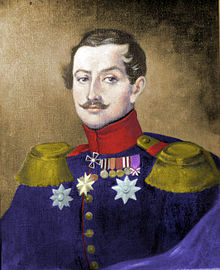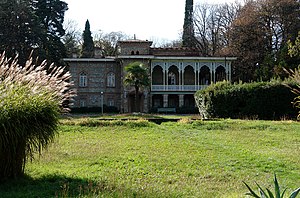Alexander Chavchavadze
Alexander Chavchavadze | |
|---|---|
 | |
| Native name | ალექსანდრე ჭავჭავაძე |
| Born | 1786 Saint Petersburg, Russian Empire |
| Died | 6 November 1846 (aged 59–60) |
| Allegiance | Russian Empire |
| Service/ | Imperial Russian Army |
| Years of service | 1811–1846 |
| Rank | Lieutenant general |
| Battles/wars |
|
| Awards | Légion d'honneur |
Prince Alexander Chavchavadze (Georgian: ალექსანდრე ჭავჭავაძე, Russian: Александр Гарсеванович Чавчавадзе, romanized: Aleksandr Garsevanovich Chavchavadze; 1786 – 6 November 1846) was a Georgian poet, public benefactor and military figure. Regarded as the "father of Georgian romanticism", he was a pre-eminent Georgian aristocrat and a talented general in the Imperial Russian service.
Early life
Alexander Chavchavadze was a member of the
He was born in 1786, in
Alexander's early education was Russian. He first saw his native Georgia at the age of 13, when the family moved back to

Following a year's exile in
During the
, whose writing entered Georgian literature through Chavchavadze.Military and political career
In 1817, Prince Chavchavadze became a colonel of the Russian army. Promoted to
Back in Georgia, Alexander enjoyed overwhelming popularity among the Georgian nobility and people. He was highly respected by his fellow Russian and Georgian officers. At the same time, he was regarded as Georgia's most refined, educated and wealthy 19th-century aristocrat, fluent in several European and
the hopeless love that made him the greatest poet of Georgian Romanticism.At his Italianate summer mansion in Tsinandali, Kakheti, he frequently entertained foreign guests with music, wit, and – most especially – the fine vintages made at his estate winery (marani). Chavchavadze built Georgia's oldest and largest winery where he combined European and centuries-long Georgian wine-making traditions. The highly regarded dry white Tsinandali is still produced there.[4] According to his acquaintance, Juan Van Halen, Chavchavadze, "a Georgian prince, educated in Europe,... though serving in our regiment with the rank of colonel, had succeeded, without neglecting his military duties, in improving his valuable inheritance in such a manner that few Georgian nobles can compare with him in wealth."[5]

Despite his loyal service to the Russian crown, Chavchavadze's nostalgia for Georgia's lost independence, monarchy, and the
He was promoted to
In 1846, Alexander Chavchavadze fell victim to an accident,[1] under somewhat mysterious circumstances: while returning to his palace in Tsinandali at night, somebody from the nearby woods approached him and splashed hot water while he was galloping on his horse. He lost the control of the horse and crashed into the ditch nearby. He died from the resultant severe head injuries. Although the tragedy was most likely an accident, it was rumoured that he was killed by Russian assassins. He was buried at the Shuamta Monastery in Kakheti, Georgia.
Chavchavadze was survived by a son, David, who was also a lieutenant general in the Russian service during the Caucasus Wars, and three daughters, Nino, Catherine, and Sophia.
Writings

Chavchavadze's influence over Georgian literature was immense. He moved the Georgian poetic language closer to the vernacular, combining the elements of the formal wealth and somewhat artificial antiquated "high" style inherited from the 18th-century Georgian
Chavchavadze's contradictory career – his participation in the struggle against the Russian control of Georgia, on one hand, and the loyal service to the tsar, including the suppression of Georgian peasant revolts, on the other hand – found a noticeable reflection in his writings. The year 1832, when the Georgian plot collapsed, divides his work into two principal periods. Prior to that event, his poetry was mostly impregnated with laments for the former grandeur of Georgia, the loss of national independence and his personal grievances connected with it; his native country under the Russian empire seemed to him a prison, and he pictured its present state in extremely gloomy colors. The death of his beloved friend and son-in-law, Griboyedov, also contributed to the depressive character of his writings of that time.

In his Romantic poems, Chavchavadze dreamed of Georgia's glorious past, when "the breeze of life past" would "breathe sweetness" into his "dry soul." In poems Woe, time, time (ვაჰ, დრონი, დრონი), Listen, listener (ისმინეთ მსმენნო), and Caucasia (კავკასია), the "Golden Age" of medieval Georgia was contrasted with its unremarkable present.[6] As a social activist, however, he remained mostly a "cultural nationalist," defender of the native language, and an advocate of the interest of Georgian aristocratic and intellectual elites. In his letters, Alexander heavily criticized Russian treatment of Georgian national culture and even compared it with the pillaging by Ottomans and Persians who had invaded Georgia in the past.[3] In one of the letters he states: The damage which Russia has inflicted on our nation is disastrous. Even Persians and Turks could not abolish our Monarchy and deprive us of our statehood. We have exchanged one serpent for another.[2]
After 1832, his perception of the national problems became different. The poet unambiguously pointed out those positive results which had been brought about by the Russian annexation, though the liberation of his native land remained to be his most cherished dream.
Chavchavadze also composed a historic work, "The Short sketches of the history of Georgia from 1801 to 1831."
Honours and awards
- Order of St. Anne, 1st Class
- Order of Vladimir, 2nd Class
- Order of the White Eagle
- Legion of Honour (France)
See also
- Chavchavadze, Georgian surname
References
- ^ ISBN 0-89875-672-3, p. 181
- ^ Allen, WED (1971), A History of the Georgian people: From the Beginning Down to the Russian Conquest in the Nineteenth Century, New York City: Barnes & Noble, p. 234.
- ^ ISBN 0-88184-042-4, p 54.
- ISBN 0-520-21929-5, p. 53.
- ^ Van Halen, Don Juan (1828). Narrative of Don Juan Van Halen's Imprisonment in the Dungeons of the Inquisition at Madrid: And His Escape in 1817 and 1818. New York: J & J Harper. p. 269.
kahetia 1812.
- ISBN 0-253-20915-3, p. 124
- ISBN 0-89875-570-0, p. 50
- ISBN 0-7007-1163-5, p. 148
- ^ "My Sadness, song". Мир русской грамзаписи. The World of Russian Records. Retrieved 2022-07-11.
External links
- (in Russian) Марков, Александр (Международная Лермонтовская Ассоциация, 2006). Грузинский князь Александр Чавчавадзе
